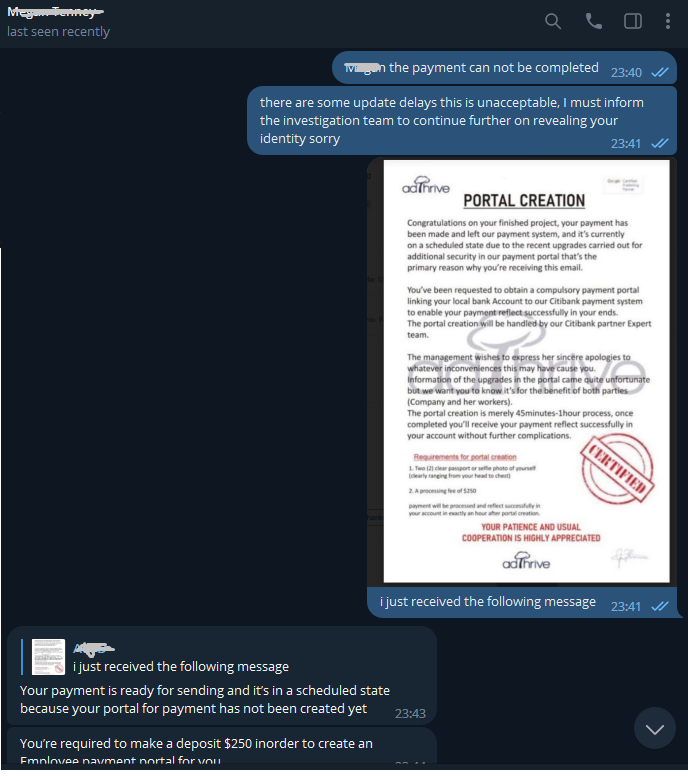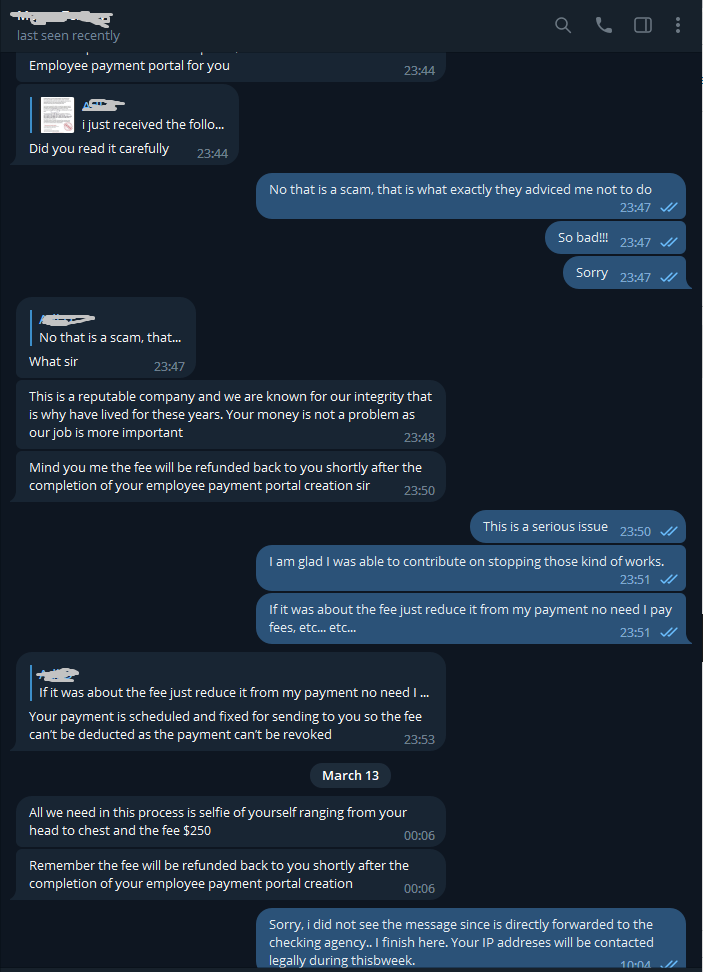As a freelancer, you may feel confident in your ability to spot scams and avoid them. But unfortunately, scammers are always coming up with new tactics to try and take advantage of unsuspecting individuals.
Let me tell you a cautionary tale about how I fell victim to a scam despite their years of experience.
Contacted through a Facebook WordPress group
Every work, outside of freelance platforms, like Upwork, PPH, Fiver etc.. that does not have payment security, is always suspicious! Someone was offering typing work that paid $28 for each screenshot of text typed into PDF format. The offer seemed too good to be true, but I decided to give it a try anyway.
The person contacting them claimed to be from a company called AdThrive, but a quick Google search revealed that the job might be a scam. However, I ignored the inner voice and went ahead with the job anyway. Not to be so loud, from the inside, I was so curious to know how those scammers work, how they deal with the situation!
They sent me a contract
The scammers sent a contract with a signature and asked for details, but BEEING smart enough not to reveal their address or banking details. When asked about the legitimacy of the job, the scammers simply dismissed any concerns and claimed to be a real company. or they ignored the message and did not reply at all.
Of course I did not reveal any address details or banking details to them, and made them change the policy inside the contract before I started working.
But, I did never send a signed contract back! Neither way, they continued, and I continued as well. When I asked that I am afraid for the job if is not real, they just typed a short answer and replied with a question why would they be laying as a real company. The person contacting me was not even into the company team members into the website, and I asked directly, they, of course denied.
Requesting to start chatting on Telegram
Once telegram chatting started they send all the details there and shared the 200 files.
I started working…
After malware scan of the received files, I started working on the 200 screenshots. Work was done USING SOFTWARE to scan and type the words, than while checking, I discovered that the screenshots were taken from various online random websites. Alarm on!
This confirmed my suspicion that the job was indeed a scam, but I decided to see it through to the end. Delivered the work through email claiming that is a company email, which was only gmail account! After 2 hrs, got a confirmation that my work is accepted and I should send payment details so they process the payment immediately for 1hr, hoooraaaayyyyy.

Receiving the payment
So far so good. When it was time for payment, the scammers sent an email asking me to open an account with their company and deposit $250 to receive the rest of the payment. I realized that this was a pure scam and demanded their rightful payment, which was never received… I asked them why they do such scams, and that I will report their IPs into CyberCrime defence organisations…

This story serves as a warning to all freelancers out there.
Always be cautious and do your research before accepting any job offers, especially if they seem too good to be true. Remember, if something seems off, it probably is.
For me, this does not end here!
Being white hat hacker, and trained on Information Security, I plan to send them multiple messages, to warn them that their IP addresses will be monitored for any future suspicious activity! I might even go beyond this and do some serious warning to them since this is so wrong…

I will win this case, by scamming the scammers!
If my plan works, I will keep you updated 🙂
How online scam and fraudulent behaviour can be reported in EU
In the EU, online scams and frauds can be reported to a variety of authorities and organizations. Here are some options:
- National authorities: Each EU member state has its own national authorities responsible for investigating and prosecuting fraud and scams. Victims can contact the police or other relevant authorities in their country to report the crime.
- European Consumer Centre (ECC): The ECC provides advice and assistance to consumers who have been affected by cross-border disputes within the EU. They can help consumers to resolve complaints and report scams to the appropriate authorities.
- European Anti-Fraud Office (OLAF): OLAF investigates fraud and other illegal activities that affect the EU’s financial interests. They can also help consumers who have been affected by scams that involve EU funds or programs.
- Europol: Europol is the EU’s law enforcement agency, and they focus on combating serious international crimes such as cybercrime and fraud. They work closely with national authorities and other organizations to investigate and prosecute criminals.
- National Cyber Security Centres (NCSCs): Each EU member state has its own NCSC, which is responsible for protecting national critical infrastructure and combating cyber threats. They can also provide advice and support to individuals who have been affected by online scams and frauds.
It’s important to note that reporting a scam or fraud can help to protect other consumers from falling victim to the same scheme. If you have been the victim of an online scam or fraud, you should report it as soon as possible to the appropriate authorities.

RenatadoUse
This post brought up something powerful—how behavior change starts with the tiniest decisions we often overlook.
There’s so much noise out there about habit formation and behavior change, but this book breaks it down into something simple, doable, and effective.
What makes this book different is that it focuses on minimum viable habits—just tiny actions that remove resistance and help you stick with real goals over time.
Mia Davis
Hello qasje.com,
You’re providing insightful content for your readers.
By the way, I know a great solution that can make your website more engaging. It’s an AI-powered platform that transforms your ideas into professional whiteboard doodle videos in just a few clicks. It’s simple to use and requires no design experience.
Whether you’re a content creator, this tool helps you boost your audience engagement significantly. Imagine your ideas coming to life in a fun and visual way.
Plus, these videos are great for promoting your services online, and they’re also a professional way to impress audiences during meetings or talks.